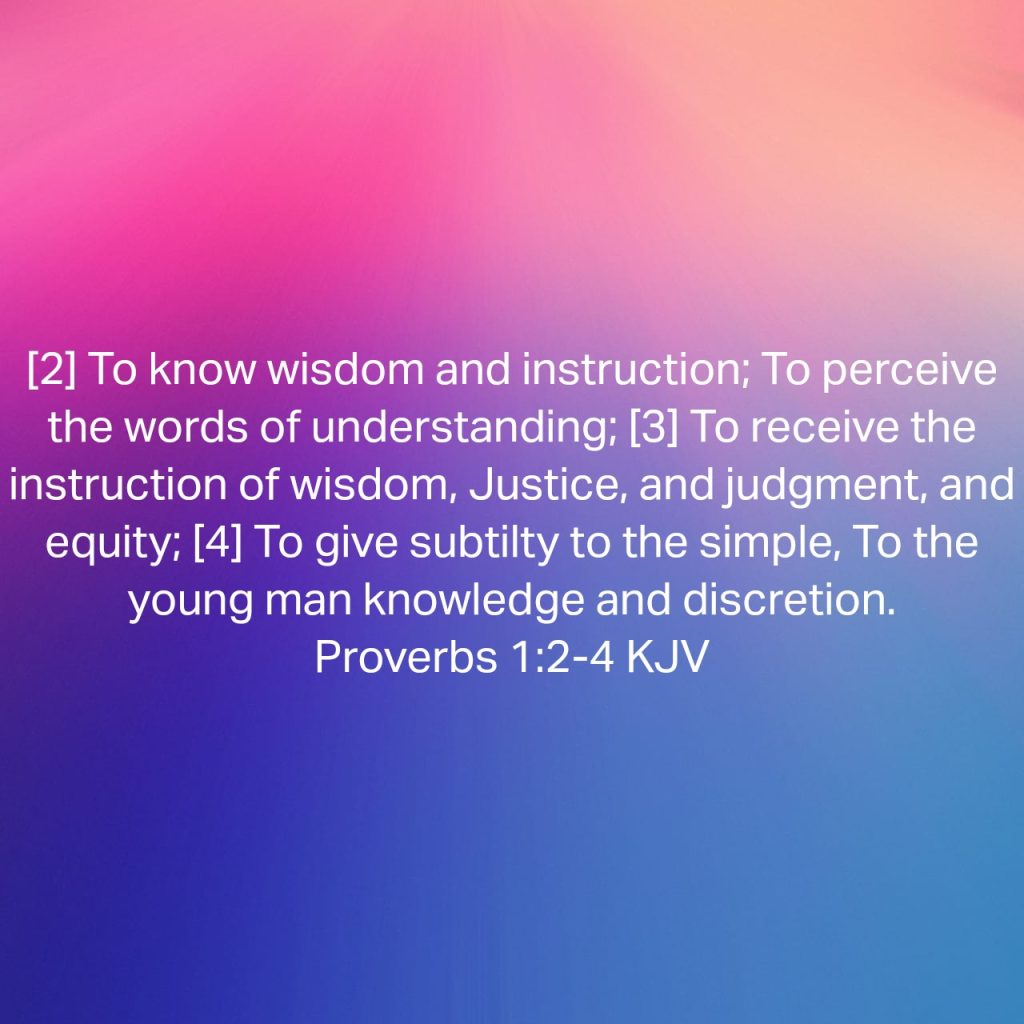The phrase “As a man thinketh in his heart, so is he,” drawn from Proverbs 23:7, underscores the profound impact of our thoughts on our identity and actions. This biblical principle teaches that our inner thoughts and attitudes shape our character and ultimately determine our destiny. By examining this concept through various scripture references, we gain deeper insight into the transformative power of our mindset. Proverbs 23:7 states, “For as he thinketh in his heart, so is he.” This verse highlights the intrinsic connection between our thoughts and our true self. It suggests that our internal beliefs and attitudes influence our behavior and life outcomes, emphasizing the importance of cultivating… Read More
Continue Reading
Proverbs 10:19 (KJV)
“In the multitude of words there wanteth not sin: but he that refraineth his lips is wise.” Read more here. Introduction Proverbs 10:19 offers wisdom on the use of words, highlighting the dangers of excessive speech and the virtue of restraint. Interpretation This verse teaches that excessive talking often leads to sin, while wisdom is found in being careful and restrained with one’s words. It emphasizes the importance of thoughtful and measured speech. Modern Day Application Across Various Fields 1. Theology Encourages believers to practice restraint and thoughtfulness in their speech, avoiding the pitfalls of excessive talking. 2. Philosophy Promotes the value of silence and contemplation, stressing the importance of… Read More
Continue Reading
Proverbs 29:18 (KJV)
“Where there is no vision, the people perish: but he that keepeth the law, happy is he.” Read more here. Introduction Proverbs 29:18 emphasizes the necessity of vision and adherence to the law for the well-being and happiness of individuals and communities. Interpretation This verse suggests that without a guiding vision or revelation, people lose direction and purpose, leading to disorder and decline. Conversely, those who follow the law and adhere to righteous principles experience happiness and fulfillment. Modern Day Application Across Various Fields 1. Theology Highlights the importance of divine guidance and adherence to God’s commandments for a prosperous spiritual life. 2. Philosophy Encourages the exploration of visionary leadership… Read More
Continue Reading
Proverbs 1:7 (KJV)
“The fear of the LORD is the beginning of knowledge: but fools despise wisdom and instruction.” Read more here. Introduction Proverbs 1:7 highlights the foundational principle that reverence for the Lord is the starting point of true knowledge. It contrasts the wise, who seek understanding, with fools, who reject wisdom and instruction. Interpretation This verse underscores the importance of a reverent relationship with God as essential for gaining true knowledge and wisdom. It also portrays the rejection of wisdom and instruction as foolish. Modern Day Application Across Various Fields 1. Theology Emphasizes the necessity of a reverent relationship with God as the basis for true knowledge and understanding. 2. Philosophy… Read More
Continue Reading
Proverbs 1:2-4 (KJV)
“[2] To know wisdom and instruction; to perceive the words of understanding; [3] To receive the instruction of wisdom, justice, and judgment, and equity; [4] To give subtilty to the simple, to the young man knowledge and discretion.” Read more here. Introduction Proverbs 1:2-4 outlines the purpose of the Book of Proverbs, emphasizing the acquisition of wisdom, understanding, and instruction in various virtues. Interpretation These verses highlight the goals of gaining wisdom, understanding insightful words, and receiving instruction in wisdom, justice, judgment, and equity. They aim to provide subtlety to the inexperienced and impart knowledge and discretion to the young. Modern Day Application Across Various Fields 1. Theology Encourages the… Read More
Continue Reading
Proverbs 3:3-7 (KJV)
“[3] Let not mercy and truth forsake thee: bind them about thy neck; write them upon the table of thine heart: [4] So shalt thou find favour and good understanding in the sight of God and man. [5] Trust in the LORD with all thine heart; and lean not unto thine own understanding. [6] In all thy ways acknowledge him, and he shall direct thy paths. [7] Be not wise in thine own eyes: fear the LORD, and depart from evil.” Read more here. Introduction Proverbs 3:3-7 offers guidance on maintaining mercy and truth, trusting in the Lord, and seeking His guidance for a righteous life. Interpretation These verses emphasize… Read More
Continue Reading
Proverbs 1:7 (KJV)
“The fear of the LORD is the beginning of knowledge: but fools despise wisdom and instruction.” Read more here. Introduction Proverbs 1:7 highlights the foundational principle that reverence for the Lord is the starting point of true knowledge. It contrasts the wise, who seek understanding, with fools, who reject wisdom and instruction. Interpretation This verse underscores the importance of a reverent relationship with God as essential for gaining true knowledge and wisdom. It also portrays the rejection of wisdom and instruction as foolish. Modern Day Application Across Various Fields 1. Theology Emphasizes the necessity of a reverent relationship with God as the basis for true knowledge and understanding. 2. Philosophy… Read More
Continue Reading
Proverbs 1:5-6 (KJV)
“[5] A wise man will hear, and will increase learning; and a man of understanding shall attain unto wise counsels: [6] To understand a proverb, and the interpretation; the words of the wise, and their dark sayings.” Read more here. Introduction Proverbs 1:5-6 emphasizes the value of wisdom and understanding, highlighting the importance of learning and seeking wise counsel. Interpretation These verses suggest that wise individuals are open to learning and continuously seek to expand their knowledge. Understanding proverbs and wise sayings involves not just hearing but also interpreting and applying their deeper meanings. Modern Day Application Across Various Fields 1. Education Promotes lifelong learning and the pursuit of knowledge,… Read More
Continue Reading
Proverbs 1:2-4 (KJV)
“[2] To know wisdom and instruction; to perceive the words of understanding; [3] To receive the instruction of wisdom, justice, and judgment, and equity; [4] To give subtilty to the simple, to the young man knowledge and discretion.” Read more here. Introduction Proverbs 1:2-4 introduces the purpose of the Book of Proverbs, outlining its goals of imparting wisdom, instruction, and understanding. Interpretation These verses emphasize the value of wisdom and instruction for living a just and equitable life. They highlight the importance of understanding, discernment, and knowledge, especially for the young and inexperienced. Modern Day Application Across Various Fields 1. Education Stresses the importance of lifelong learning and acquiring knowledge,… Read More
Continue Reading